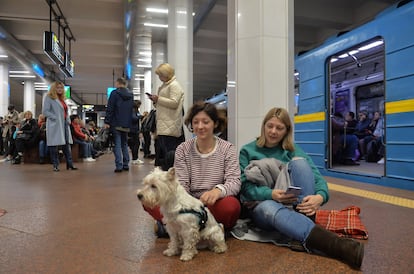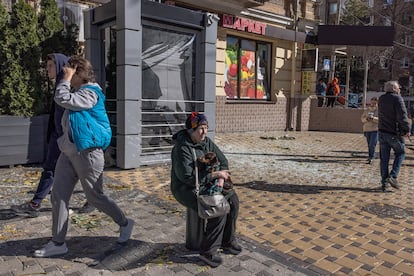Fear returns to the streets of Kyiv following Russian strikes
The missile attacks against the Ukrainian capital on Monday targeted neighborhoods that house political power and diplomatic representations, sending a message that no place is safe

It had been months since the residents of Kyiv last had to run for shelter. The seven missiles that struck the city center on Monday morning were like a rude awakening from a sense of false security. And when air raid sirens sounded again on Monday afternoon, the streets of the capital quickly became deserted.
One of the most unpopular features of the Ukrainian capital is the heavy car traffic on its streets. During the first six months of the invasion, there was a commonly heard comment among remaining residents that the only good thing the war had brought was that traffic jams had disappeared. The traffic snarls flared up again in the fall, as most of the people who had left the city at the beginning of the invasion returned to their homes. The streets were full of life again and cafés were packed on weekends. Spirits were also improving as the Ukrainian armed forces continued to push back the invader on the front lines.
But the strikes on Monday have evaporated the population’s good spirits. Businesses that had resumed activity during the summer were closed all day. The few supermarkets that remained open had long lines of people waiting to stock up on basic products, fearful of a military escalation in the capital that might force them to live in lockdown for an indefinite period of time.
“People, despite everything, are calmer. There is no panic like there was at the start of the war, when Kyiv was besieged, although now there is more anger,” said Elisa, a 26-year-old woman who spent the morning sheltering inside the Olympic Stadium subway station. The stations and underground passes were filled with citizens, in scenes unseen since the first months of the war. The Russian missiles that had fallen on Kyiv four months earlier targeted a residential neighborhood far from the historic center and the halls of power. But on this occasion, the Kremlin ordered the heart of the city to be punished in retaliation for last Saturday’s sabotage on the Kerch Strait bridge in occupied Crimea.

“Of course I imagined such an attack could happen, I watch the news all day. I have not forgotten that Russia is a terrorist state,” said Daria Reshetnikova, sitting in the subway station with a crime novel to while away the hours. Reshetnikova left the city when the Russians arrived in the outskirts in February, but did not hesitate to return when the invaders retreated from the area.
International diplomatic delegations have followed a similar pattern. European Union Justice Commissioner Didier Reynders was in Kyiv during the attack on Monday. The staff of the EU’s institutions in the city were summoned in the early afternoon and instructed to spend the night at the residence of the EU ambassador. EL PAÍS was able to speak with a member of the Reynders team, who was planning to spend more days in the capital. Among his luggage there was a tennis racket. “It is a sign of the good spirits with which I came here,” said this senior EU official. Other European sources said they had been warned that there would be an escalation of Russian strikes far from the front in October, in response to defeats on the battlefield.

Cities closer to the military action, such as Kharkiv in the east, or Mikolaiv in the south, are regularly targeted by attacks like the one that Kyiv suffered on Monday. The difference lies in the symbolism of hitting the heart of the country, in neighborhoods that are home to the political power and to diplomatic representations of Ukraine’s international allies. A German visa office was partially destroyed, and several Russian military Telegram accounts claimed that a missile that hit the capital’s Glass Bridge was aimed at an EU office located beside it.
Unlike previous days, on Monday the streets were already deserted hours before the start of the 11pm curfew, reflecting widespread fear that nighttime might bring new messages of death from Russia. And with Ukrainian troops gaining new ground in the war, the population is assuming that terror campaigns like Monday’s will become more frequent.
Tu suscripción se está usando en otro dispositivo
¿Quieres añadir otro usuario a tu suscripción?
Si continúas leyendo en este dispositivo, no se podrá leer en el otro.
FlechaTu suscripción se está usando en otro dispositivo y solo puedes acceder a EL PAÍS desde un dispositivo a la vez.
Si quieres compartir tu cuenta, cambia tu suscripción a la modalidad Premium, así podrás añadir otro usuario. Cada uno accederá con su propia cuenta de email, lo que os permitirá personalizar vuestra experiencia en EL PAÍS.
¿Tienes una suscripción de empresa? Accede aquí para contratar más cuentas.
En el caso de no saber quién está usando tu cuenta, te recomendamos cambiar tu contraseña aquí.
Si decides continuar compartiendo tu cuenta, este mensaje se mostrará en tu dispositivo y en el de la otra persona que está usando tu cuenta de forma indefinida, afectando a tu experiencia de lectura. Puedes consultar aquí los términos y condiciones de la suscripción digital.








































